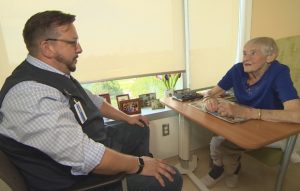
A coping mechanism and an escape “One of the things that patients really struggle with when they get a diagnosis […]
A coping mechanism and an escape
“One of the things that patients really struggle with when they get a diagnosis of a life-threatening illness … they can often lose their sense of who they are, sort of lose the sense of what’s meaningful to them in their life,” she said. “So a big part of what we do in palliative care is help them reconnect to who they are.”
It can also help take them out of their pain, at least according to Parker and Steinberg.
The physician hopes at some point to have her patients rate both their mental well-being and their pain, both before and after “travelling” with Parker.

At 83, Muzzi is a seasoned traveller. She’s met at least five times with Parker and this time he takes her to the heart of the city: Nathan Phillips Square on a summer day. The sun glimmers off the pond, creating a rippled reflection of the iconic Toronto sign.
She loves seeing the water especially. She remembers the warmth of the sea off Corsica, a rainbow of fish and coral gliding beneath her.
“Those were beautiful that you had,” she said of an older video of scuba diving among coral Parker immersed her in during another virtual visit. “They were so red and so orange and so beautiful.”
“I did do a lot of those” — she mimes a mask.
“Snorkelling,” Parker interjects, helping her find the English word she’s forgotten for her native Dutch.
“Every single week I’m going to bring you something and ask, ‘Is it as good as the coral? And then one time, you’re going to go, ‘That was better.’”
“Oh, I don’t know,” she says, her face creased in a smile.
It’s a challenge — and one Parker hopes they’re given the time to fulfil.
